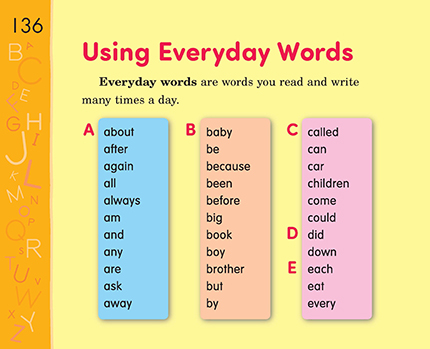Page 136 from

Start-Up Activity
Pages 136–139 feature important sight words that first graders should become familiar with. Introduce this list by writing a few of the longer words on the board: "because," "brother," "children," "father," "friend," "mother," "people," "question," "something," and "sometimes." Point to a word and ask students to raise their hands if they know what it is. Help the whole class sound out each word.
Next, ask the students what they notice about all of these words. They are long and a little difficult, true. They also name some of the most important things in our lives: family members and friends. Students need to learn these words, and all of the other ones on pages 136–139 so that they can write about the most important parts of their lives.
Enrichment Activity: Refer to “Using Theme Words” starting on page 168 for other words that are connected with inviting illustrations.
Think About It
“Kind words do not cost much. Yet they accomplish much.”
—Blaise Pascal

Start-Up Activity
Pages 136–139 feature important sight words that first graders should become familiar with. Introduce this list by writing a few of the longer words on the board: "because," "brother," "children," "father," "friend," "mother," "people," "question," "something," and "sometimes." Point to a word and ask students to raise their hands if they know what it is. Help the whole class sound out each word.
Next, ask the students what they notice about all of these words. They are long and a little difficult, true. They also name some of the most important things in our lives: family members and friends. Students need to learn these words, and all of the other ones on pages 136–139 so that they can write about the most important parts of their lives.
Enrichment Activity: Refer to “Using Theme Words” starting on page 168 for other words that are connected with inviting illustrations.
Think About It
“Kind words do not cost much. Yet they accomplish much.”
—Blaise Pascal